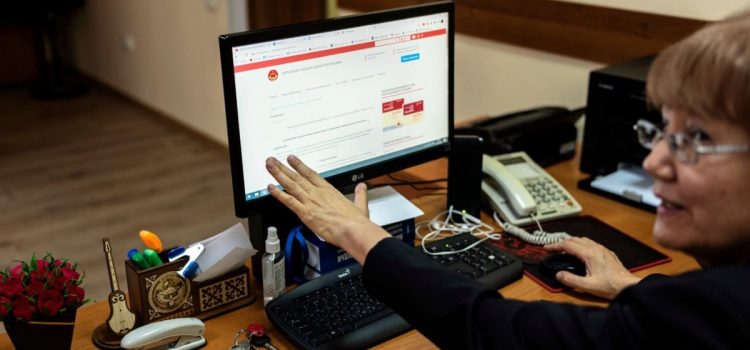How a website brought transparency and justice to Kyrgyzstan’s land disputes.
When Mr. Akylbek Azhimamatov was purchasing 19 acres of land for his growing petroleum products supply company in 2015, he did not expect that his purchase would become a 2.5 year-long court battle. He bought the land plot in Kara-Balta, Kyrgyzstan, from a bank which held it as collateral from the former owners who failed to repay their loan on time. After his purchase, he found out that the land wasn’t properly privatized. Despite owning the title for the property, he had to challenge his right to it in court.

“We duly paid for this land, which had a great strategic value for expanding our growing business with the railway going right by our warehouse. It would make logistics of supplying gas and diesel fuel for farmers so much more cost efficient. But I could not proceed without the full ownership rights.”
Mr. Azhimamatov lost the case twice, first in district courts and then in regional level courts.
“When we lost the first time, I thought it wouldn’t work,” he said.
LAND DISPUTES AND ERRORS
Mr. Azhimamatov’s case is not unique in Kyrgyzstan, a mountainous country of 6 million people. Complications with land ownership rights stem from the government’s massive privatization campaign in the 1990’s after the collapse of the Soviet Union. As the sole owner of all the land in the country, the State distributed over 3 million acres of arable land to private hands in just 4 to 5 years.
This rushed, massive privatization left a lot of room for disputes, which were exacerbated by continued legal reforms, mass migration, corruption, and other issues. Every year, land disputes are responsible for at least 30% of the caseload of the Kyrgyz courts. Errors and misinterpretation of laws by judges have led to unfair decisions in courts.
ACT.SOT.KG OFFERS SOLUTIONS
Indira Aitbaeva and Baktiyar Parpiev, two independent legal experts, decided to tackle the issue of inconsistent court decisions on land disputes. Since 2015, they have reviewed hundreds of land disputes considered by the courts all over the country to analyze errors.
The review was made possible by a new online database of judicial decisions, ACT.SOT.KG, developed through the support of USAID’s International Development Law Organization (IDLO) Trusted Judiciary program. The project worked with hundreds of staffers, IT specialists, and judges in the judicial system to develop this groundbreaking tool. Before ACT.SOT.KG and relevant amendments to legislation, getting a single judicial decision was almost impossible for a person outside the judicial system without consent of the Supreme Court.

Today, ACT.SOT.KG houses more than 275,000 cases publically available at the click of a button. Courts across the country are now publishing over 90% of their decisions and sharing other procedural documents for public access.
Going through court decisions one-by-one, Aitbaeva and Parpiev discovered numerous inconsistencies in interpretation of the laws and errors made by judges. The problems included everything from ownership rights, determining boundaries of land plots, acquiring land, legal procedures, and more.
Ms. Aitbaeva says that the database helps to see the bigger picture. “You get an overview of judicial practice throughout the country sitting in your office. All you need is the Internet.”
“Very quickly we got used to the fact that our arms became longer. In a short time, we began to process a very large amount of information” adds Mr. Parpiev.
UNIFYING JUDICIAL PRACTICES
The experts’ analysis clearly indicated all the inconsistencies in court decisions on land disputes. They also prepared recommendations to help resolve similar land dispute cases in the future.
In 2018, the Plenum of the Supreme Court used these recommendations in making a policy on consideration of land disputes mandatory for the entire judiciary system of the Kyrgyz Republic.
“Since this issue was raised and highlighted, and the recommendations of the Supreme Court were adopted, the judges will slowly begin to be guided by them, and come to a unified practice,” Parpiev says.
RESOLVING THE CASE
In 2017, Mr. Azhimamatov appealed his case to the Supreme Court. The highest court accepted his appeal and resolved the dispute in favor of Mr. Azhimamatov.
“It was a turning point that made me believe that justice exists,” says Azhimamatov. “With this additional land plot I was able to offer gas, fuel supply, and storage to the farmers and municipal enterprises of Kara-Balta at a lower rate. Besides that, we can also rent some of our warehouses to the farmers to store agricultural produce while they are awaiting transportation and export.”
According to Mr. Parpiev, this case is a perfect illustration of inconsistencies that existed in judicial practice around land disputes. Throughout his research, he found different courts have been using different approaches to the same land issue. But he is hopeful that these differences will fade away as courts throughout Kyrgyzstan adopt unified judicial practices.

In 2020, Ms. Aitbaeva, together with advocate-lawyers Mr. Almaz Akmataliev and Ms. Venera Boltobaeva, used the same act.sot.kg website to conduct a nationwide analysis of judicial practice on land disputes. The comparative analysis revealed significant improvements in judicial practice. According to Ms. Aitbaeva, the court practice on land disputes has become more consistent with the law, thus reducing corruption and increasing transparency in the judiciary.
#USAIDTRANSFORMS
#DEVJOURNEY
Learn more about USAID’s Digital Development Awards. Follow @USAID.
ABOUT THIS STORY
USAID’s 2020 Digital Development Awards (the “Digis”) recognize USAID projects that harness the power of digital tools and data-driven decision making. USAID/Kyrgyz Republic: USAID-IDLO Judicial Strengthening / Trusted Judiciary Program was one of five winners chosen out of 140 applicants.
USAID/Kyrgyz Republic: USAID-IDLO Judicial Strengthening / Trusted Judiciary Program won for creating and helping to implement a holistic e-justice initiative that strengthens the integrity of the justice system, minimizes corruption, and enhances transparency.
Footnote:
Photos by Maxime Fossat for USAID




